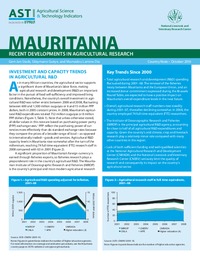Authors:
Stads, Gert-Jan; Guèye, Sileymane; Dia, Mamadou Lamine
Year:
2010
Publisher
International Food Policy Research Institute (IFPRI); and National Livestock and Veterinary Research Center (CNERV)
Back to:
Being a sparsely populated desert country, Mauritania’s total agricultural R&D capacity and investments are understandably significantly lower than those of many West African countries. In 2008, the country employed 74 agricultural R&D staff in FTEs and spent 752 million ouguiyas or 8 million PPP dollars on agricultural R&D (both in 2005 prices). Fisheries research dominates Mauritania’s agricultural research system. The 2002 signing of a fisheries treaty between Mauritania and the European Union prompted a large influx of funding, causing IMROP to gain official institute status and expand its human resource capacity. The 2008 establishment of ONISPA, which had previously been a department of IMROP, prompted a decline in IMROP’s overall capacity and expenditure levels; however, the renewal of the fisheries treaties between Mauritania and the European Union and Japan, ensures that the institute’s R&D funding will remain relatively secure in the years to come.
This situation sharply contrasts that of CNRADA and CNERV, the country’s main agencies for crop and livestock research. Both centers have seen their R&D budgets shrink since the completion of PSA in 2000, which had been funded through a World Bank loan. Training opportunities for staff are limited, and retiring staff members are not being replaced, causing a gradual aging of the scientist pool. The situation at the University of Nouakchott is not much better.
In summary, Mauritania’s agricultural R&D system is split: on the one hand, IMROP is relatively well-funded and benefits from modern facilities, whereas on the other hand, entities like CNRADA, CNERV, and the other government and higher education agencies struggle financially and consequently have difficulty attracting well-qualified research staff. Sustainable financial support is crucial for all of Mauritania’s agricultural research agencies, not just those focused on the incomegenerating fisheries sector. Funding is especially needed for those entities focused on helping to produce much-needed food crops and to promote development initiatives to mitigate rural poverty. Unfortunately, the Government of Mauritania currently lacks the means, capacity, and sense of urgency to implement far-reaching S&T policies in favor of the agricultural sector.

